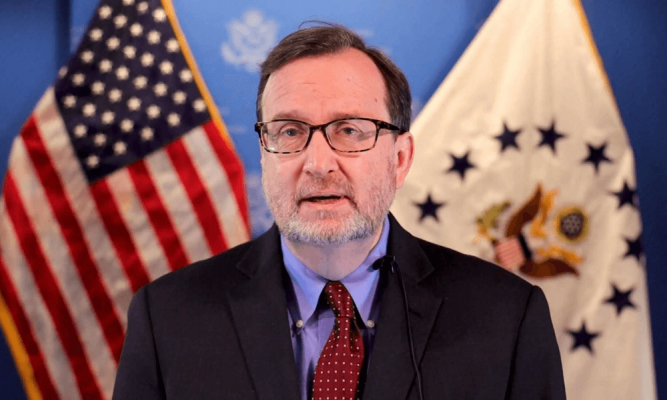
The United States government has reaffirmed its commitment to supporting Nigeria’s efforts in combating economic and financial crimes, corruption, and terrorism financing.
During a familiarisation visit to the headquarters of the Economic and Financial Crimes Commission (EFCC) in Abuja on Tuesday, the US Ambassador to Nigeria, Richard Mills Jr., described anti-corruption and counter-terrorism efforts in Nigeria as high priorities for the US government.
According to a statement by the EFCC’s Head of Media and Publicity, Dele Oyewale, the ambassador assured EFCC Chairman, Ola Olukoyede, of continued US support in intelligence sharing, capacity building, and other areas of cooperation.
“I’m very grateful for the relationship we have, both through our legal attaché and with these other offices here. The US government was strongly supportive of the creation of the EFCC when it was established, and our relationship has continued since then,” Mills said.
He emphasised that corruption and financial crimes negatively impact both countries, stressing the need for collaboration to promote security and economic growth. “Part of the reason we’re so interested in these issues is because they affect both our countries, and they affect what we’re both trying to do, which is to create a secure, prosperous Nigeria and build our economies,” he added.
Mills noted that the EFCC’s work in counter-terrorism, money laundering, and financial crimes is a priority for both the US government and its mission in Nigeria.
Responding, EFCC Chairman Olukoyede expressed appreciation for the US government’s longstanding partnership. He highlighted the Commission’s commitment to combating financial crimes through prevention, investigation, prosecution, and asset recovery.
“The relationship between the United States and Nigeria in fighting financial crimes dates way back and has been one of strong synergy and mutually beneficial collaboration. We hope to build on this, strengthen it, and take it to the next level,” Olukoyede said.
He requested enhanced US support, particularly in technology, intelligence gathering, and human capital development, noting the intelligence-driven nature of the Commission’s work. Olukoyede also called for timely responses to Nigeria’s requests, emphasising the need for efficiency in their cooperation.
In addition, Olukoyede briefed the US delegation on the EFCC’s efforts to tackle visa fraud. He disclosed the establishment of the Visa Application and Immigration Fraud Section within the Commission, aimed at addressing visa racketeering and immigration fraud across its zonal offices.
“We have been getting good results. We need your support in this area as well, through intelligence sharing and technological assistance,” he said.
Olukoyede reaffirmed Nigeria’s commitment to deepening its collaboration with the US in addressing financial crimes and other cross-border criminal activities.
